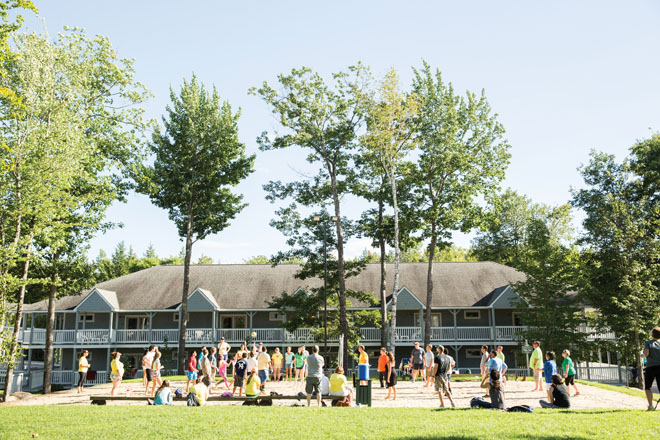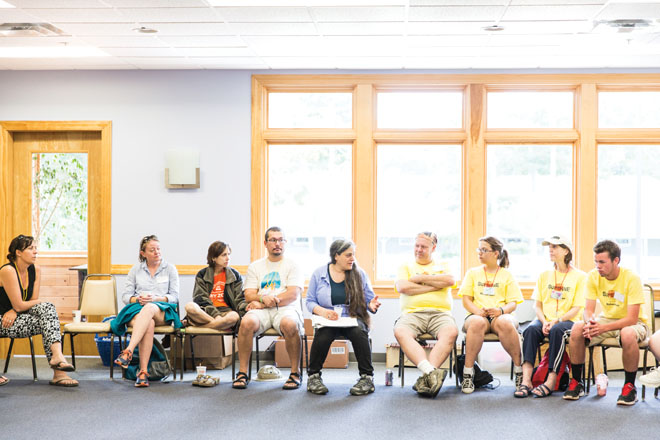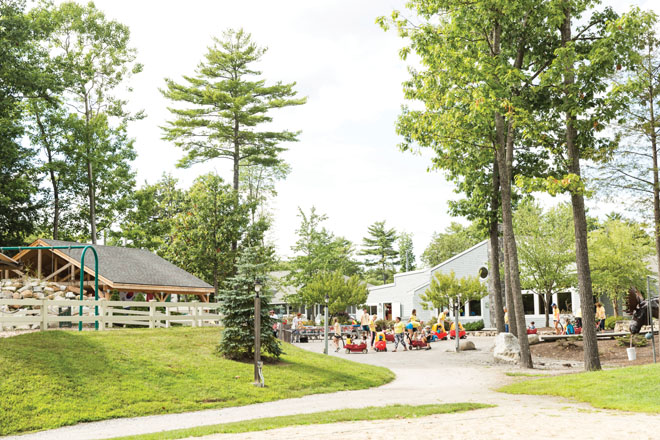Camp Sunshine
Thirty-two years of hope for children with life-threatening illnesses and their families.
A tenderly crafted mural extends over the entrance to Camp Sunshine depicting children enjoying the shade of a tree in full bloom as they sail their Wish Boats on a nearby pond. Next to the painting, three doors vary in size—one small, one large, and one in-between—welcoming children of all ages and their families to camp. These children have been diagnosed with a spectrum of life-altering illnesses, from cancers such as leukemia and lymphoma to autoimmune diseases such as lupus. Just as the rays of the painted sun illuminate the mural, so does the light of hope brighten the threshold of Camp Sunshine.
For more than 30 years, Camp Sunshine in Casco has given families access to the respite of the Maine outdoors. Originally located on the grounds of the Point Sebago Resort, Camp Sunshine first opened its doors to families impacted by childhood cancer for one week at the end of the resort’s official season in 1984. Since then, it has expanded its offerings and its physical footprint, bringing comfort over the decades to more than 48,900 family members from 49 states and 27 countries.
“Something magical happens at Camp Sunshine,” says Gorham resident Meg Dermody, whose son, Finn, who is currently in remission, survived a high-risk brain cancer called medulloblastoma. “You would think it would be the saddest place on Earth but it’s not.”
In 2011, Finn Dermody had just started kindergarten when he began waking up
at night with frequent vomiting. After three months of increasingly concerning symptoms, he ended up in the emergency room, and his family learned that the five- year-old had medulloblastoma. Surgery for the tumor rendered the previously curious and talkative child unable to walk or speak. With a partially paralyzed face, Finn could manage only a half smile.
“I felt like I lost my child for months,” says Meg, who (along with her husband, Tim) was also caring for her one-year-old daughter, Shayla, as they travelled back and forth to the Barbara Bush Children’s Hospital in Portland. “My biggest struggle was being afraid that he didn’t know what was going on.”
Two-and-a-half months later, Finn began to speak again. “His first sentence after he did start talking was, “Where is my iPad?,” says Dermody. “We got a kick out of that.” Finn needed a year of additional treatment, including six cycles of chemotherapy and radiation to the brain and spine.
“You don’t have a choice,” says Dermody. “It just happens. As a parent you do anything for your kids. No matter what the situation, you just move forward.” By January of 2013, Finn had restarted kindergarten, navigating with the help of a wheelchair until he was able to walk independently again. In June 2013, the Dermody family attended Camp Sunshine for the first time. They have returned every summer since.
“We all live with the fallacy that we can understand and relate to these families,” says Anna Gould, who co-founded Camp Sunshine with her late husband, Dr. Lawrence Gould. “I can’t think of anything worse than watching a child who is ill. How does a parent stay sane through this ordeal?”
Formerly the chairman and CEO of a Fortune 500 company based in Massachusetts, Larry Gould created Point Sebago in 1970. In 1983, the Goulds were on a trip to Canada when they saw a television program about camps for children with cancer. They wanted to create something similar in their adopted home state—and include the families of the children as well. The following year, building on conversations with the chief of pediatric oncology at the Dana-Farber Cancer Institute in Boston, they launched a pilot program, which attracted 43 children with cancer and their families to the grounds of Point Sebago.
“We kept hearing the same thing from parents and families,” says Gould. “‘You saved my marriage,’ ‘you saved my life.’ It’s hard to believe we made such an impact.” The camp, which has always been free to participants, was expanded to six sessions in the summer and fall. By 2001, Camp Sunshine had moved to its own 24-acre parcel of land next to Point Sebago, settling into a permanent year-round retreat center, which was completed with the help of many, including the Army Corps of Engineers.
With more than 25 sessions in a year, Camp Sunshine divides attendees into groups based on diagnosis. There are multiple weeks for children who have cancer and brain tumors (including a week for Spanish-speaking families), but also opportunities for children with blood disorders such as sickle cell and Fanconi anemia. There are also bereavement weeks for those who have experienced the death of a child. Families are eligible to attend until their children turn 18 and may return multiple times. Each family is housed in one of 40 private suites, which include a bedroom, living area, kitchenette, and handmade quilts for the beds.
Camp Sunshine also offers recreational activities that children may enjoy every day of the year. The activity center features an indoor pool, a cafeteria with a performance stage, and rooms that cater to the diverse children who attend—from toy-toting toddlers to foosball-playing teens. A path winds from the main building past basketball courts, an archery range, the Wish Boat Pond, and the Lawrence Gould Memorial Garden, to a waterfront marina complete with paddleboards and kayaks. In the winter, the volleyball court transitions to a skating rink, and campers can sled or snowshoe. Each week, parents are treated to a date night, while their children camp out overnight with counselors in Pop’s Yurt Village.
“Camp is magical in a variety of ways,” says psychosocial director Nancy Cincotta, MSW, MPhil. “We provide activities for every member of the family, to have an opportunity to get away from the illness. We also provide avenues for people to talk about the illness, so it’s actually the blend of the recreational and the psychosocial pieces that creates this place where you can experience maybe more joy than you have experienced since your child was diagnosed, or since you were diagnosed if you’re the child.”
Camp also offers an opportunity to network with other families. “If you think illness isolates people,” says Cincotta, “Camp Sunshine is the antidote to that.” Families enjoy being part of a community that accepts them no matter where they may be coming from. Children are divided into groups by age: the only indication that a child has an illness is her distinctly colored nametag. This is done so that counselors may be aware of any health issues that arise.
Health issues are handled by on-site physicians—many of whom have been part of the camp for decades. Medical director Andrew Eichenfield, MD, is a pediatric rheumatologist (specializing in diseases of the joints and immune system), who practices in New York. During much of the year he acts as Camp Doc, distributing medications, monitoring the health of campers, and making sure that children remain connected with their providers at home.
“Working here, you definitely gain a greater appreciation for the health of your own child,” says executive director Michael Katz. “It puts into perspective what is important and what is not.” Camp Sunshine devotees are a loyal bunch. Katz, a native of Massachusetts who has been with Camp Sunshine since the beginning, recently agreed to do ten polar dips, plunging into winter waters throughout the Northeast, from Portland’s East End Beach to Virginia, in honor of the popular fundraiser’s tenth year.
Fundraising and volunteerism remain critical pieces of Camp Sunshine’s success. From serving food in the kitchen, to acting as camp counselors, to teaching arts and crafts, carefully vetted volunteers not only staff the weekly camp sessions, but also help with events such as the annual L.L.Bean Pumpkin Festival. Katz estimates that there have been close to 35,000 volunteers in the past three decades. “We’ve been very fortunate,” says Katz. “It reaffirms your faith in humanity.”
Whether you come to Camp Sunshine as a volunteer, a camper, a staff member, or simply a visitor, you will not leave unchanged. To know that this place of peace, normalcy, joy, and camaraderie exists is to know that the sun shines on each of us equally. We are each deserving of happiness: a dip in a Maine lake, a game of foosball with friends, or a night out with our spouse. Camp Sunshine is a bright spot of hope on the New England landscape—one that will no doubt remain illuminated for decades to come.
“It’s a double-edged sword,” says Gould. “It is sad that there are so many sick kids, and wonderful to see the transformation between when they come in and when they leave.”






































